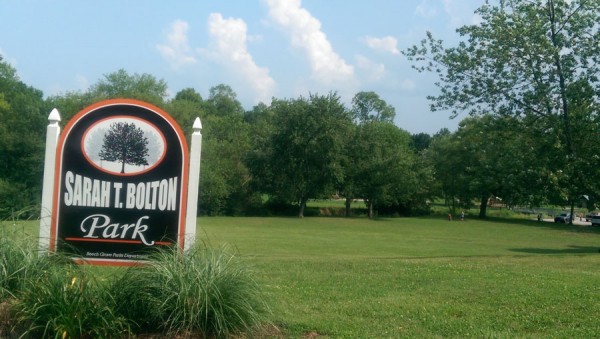‘Indiana At 200’ — ‘Paddle Your Own Canoe’
 By ANDREA NEAL
By ANDREA NEAL
James Whitcomb Riley was the most acclaimed, but he wasn’t the first Hoosier poet to gain national fame. Sarah T. Bolton deserves that honor. Even today her poem “Paddle Your Own Canoe” is cited and recited, though few know anything about its origins.
Her poetry “was known everywhere,” and the canoe poem was set to music and translated into a dozen foreign languages, according to historian Jeanette C. Nolan in the book Hoosier City. Indiana Historical Society records note that Bolton served as poet laureate of Indiana during the 1840s and 1950s.
Bolton was born Sarah Tittle Barrett in 1814 in Newport, Ky., and moved as a toddler with her parents to the Jennings County wilderness. Not liking the isolation, her father sold the farm and took the family to more civilized Madison when she was 9 where she studied Latin and read Virgil and other classics. Her first published poem appeared in the Madison Banner in 1826. She was not quite 14.
In 1831, Miss Barrett married local newspaperman Nathaniel Bolton, and the two moved to Indianapolis where they ran a dairy farm, wrote and immersed themselves in public affairs. Although Bolton had two children and performed all the traditional duties of a housewife, she was a prominent figure in Indiana and was often asked to write poems for public occasions.
 Bolton was a feminist 70 years before women gained the franchise. She lobbied for women’s rights when political leaders were rewriting the state constitution in 1850-51. Her husband served as state librarian from 1847-53 and later as clerk of a U.S. Senate committee and diplomat at Geneva, which gave Bolton the chance to travel across Europe, a subject of many of her poems. He died in 1858, and Bolton remarried, but she was always publicly known as Sarah T. Bolton.
Bolton was a feminist 70 years before women gained the franchise. She lobbied for women’s rights when political leaders were rewriting the state constitution in 1850-51. Her husband served as state librarian from 1847-53 and later as clerk of a U.S. Senate committee and diplomat at Geneva, which gave Bolton the chance to travel across Europe, a subject of many of her poems. He died in 1858, and Bolton remarried, but she was always publicly known as Sarah T. Bolton.
Modern critics dismiss her work as sentimental and commercial, as noted in a biographical sketch by the Beech Grove Public Library. Yet the evidence is overwhelming that she was held in high regard by her contemporaries. When Bowen-Merrill published a collection of her poems in 1892 under the title Songs of a Life-Time, it included an introduction by Lew Wallace and a poem by James Whitcomb Riley, whose writing careers eclipsed Bolton’s by the turn of the century.
Although anthologies of Bolton’s poetry are no longer in print, she was widely published for her era. During the Civil War, her “Union Forever!” poem was credited with rallying the North. Again, “Paddle Your Own Canoe” remains popular today and is often quoted by advocacy groups seeking to deviate from conventional wisdom. Clarke Kahlo, an environmental activist in Indianapolis, explains, “Paddling your own canoe is a great metaphor for life. We all like to have control.”
By 1871 Bolton had retired from the spotlight and bought land at Beech Bank southeast of Indianapolis – now Beech Grove — where she lived her golden years in relative quiet. She died in 1893. Although forgotten by Hoosiers, she is memorialized at a community park purchased by Beech Grove in 1930 from the Bolton Estate. The city’s website notes, “The park reflects the life and beauty that Mrs. Bolton often spoke of in her poetry.”
On a recent summer day, dozens of park visitors were enjoying the picnic areas, athletic fields and other amenities, but, when asked, none could say who Bolton was or why the park was named after her. Only a hard-to-find historical marker on Sherman Avenue near the park’s side entrance offered a brief biographical explanation.
Directions: Main entrance to Sarah T. Bolton Park is at 1300 Churchman Avenue, Beech Grove. Park can also be accessed from 17th Avenue and from Main Street at 15th Avenue.
“Paddle Your Own Canoe”
(Original text published 1897 by Bowen-Merrill Co.)
By Sarah T. Bolton
Voyager upon life’s sea,
To yourself be true,
And where’er your lot may be,
Paddle your own canoe.
Never, though the winds may rave,
Falter nor look back.
But upon the darkest wave
Leave a shining track.
Nobly dare the wildest storm,
Stem the hardest gale;
Brave of heart and strong of arm,
You will never fail.
When the world is cold and dark,
Keep an aim in view,
And toward the beacon mark
Paddle your own canoe.
Every wave that bears you on
To the silent shore,
From its sunny course has gone
To return no more.
Then let not an hour’s delay
Cheat you of your due
But while it is called today
Paddle your own canoe.
If your birth denied you wealth,
Lofty state and power,
Honest fame and hardy health
Are a better dower;
But if these will not suffice,
Golden gain pursue;
And, to win the glittering prize,
Paddle your own canoe.
Would you wrest the wreath of fame
From the hand of fate?
Would you write a deathless name
With the good and great?
Heart and soul imbue
With the holy task, and then
Paddle your own canoe.
Would you crush the giant wrong,
In the world’s free fight?
With a spirit brave and strong,
Battle for the right.
And to break the chains that bind
The many to the few,
To enfranchise slavish mind –
Paddle your own canoe.
Nothing great is lightly won,
Nothing won is lost,
Every good deed nobly done,
Will repay the cost.
Leave to Heaven, in humble trust,
All you will to do:
But if you succeed you must
Paddle your own canoe.
EDITORS NOTE: This is a series of essays leading up to the celebration of the Indiana Bicentennial In December 2016. The essays focus on the top 100 events, ideas and historical figures of Indiana, in chronological order, tying each to a place or current event in Indiana that continues to tell the story of the state.
Andrea Neal is a teacher at St. Richard’s Episcopal School in Indianapolis and adjunct scholar with the Indiana Policy Review Foundation. She has written extensively about taxes, good governance, higher education, civic education and K-12 reform. Contact her at [email protected].
Indiana Policy Review Foundation is a non-profit education foundation focused on state and municipal issues.

